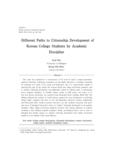

-
서지정보
· 발행기관 : 한국교육학회
· 수록지 정보 : 교육학연구 / 54권 / 1호 / 401 ~ 429페이지
· 저자명 : 김수지, 이병식
초록
This study was prompted by a consciousness of the need for today’s younger generations’ enhanced citizenship. Underlying assumptions are that higher education is essentially responsible for nurturing civic minds of the young and furthermore, that it is unquestionably capable of achieving this goal. In this regard, this research delved into college involvement predictors vital to students’ citizenship development and additionally, looked for different paths to development across academic disciplines. A stratified random sample of 5,093 juniors and seniors at 51 four-year Korean universities, was analyzed using hierarchical linear modeling (HLM 6.08). The findings indicated that students in Social Sciences reported the most development in citizenship during college, compared with those in Arts and Humanities, Business, Sciences, Engineering, and Professional fields. Another conclusive discovery was that ‘academic interaction with peers’ and ‘sense of belonging’ had positive effects on students’ citizenship development in all academic disciplines. Other college involvement predictors, however, had varying influences on students according to their affiliated academic disciplines. Finally, psychological factors such as sense of belonging had stronger impacts on students’ citizenship development than college involvement predictors in all academic fields except Business.참고자료
· 없음태그
-
자주묻는질문의 답변을 확인해 주세요

꼭 알아주세요
-
자료의 정보 및 내용의 진실성에 대하여 해피캠퍼스는 보증하지 않으며, 해당 정보 및 게시물 저작권과 기타 법적 책임은 자료 등록자에게 있습니다.
자료 및 게시물 내용의 불법적 이용, 무단 전재∙배포는 금지되어 있습니다.
저작권침해, 명예훼손 등 분쟁 요소 발견 시 고객센터의 저작권침해 신고센터를 이용해 주시기 바랍니다. -
해피캠퍼스는 구매자와 판매자 모두가 만족하는 서비스가 되도록 노력하고 있으며, 아래의 4가지 자료환불 조건을 꼭 확인해주시기 바랍니다.
파일오류 중복자료 저작권 없음 설명과 실제 내용 불일치 파일의 다운로드가 제대로 되지 않거나 파일형식에 맞는 프로그램으로 정상 작동하지 않는 경우 다른 자료와 70% 이상 내용이 일치하는 경우 (중복임을 확인할 수 있는 근거 필요함) 인터넷의 다른 사이트, 연구기관, 학교, 서적 등의 자료를 도용한 경우 자료의 설명과 실제 자료의 내용이 일치하지 않는 경우
찾으시던 자료가 아닌가요?
지금 보는 자료와 연관되어 있어요!
문서 초안을 생성해주는 EasyAI



